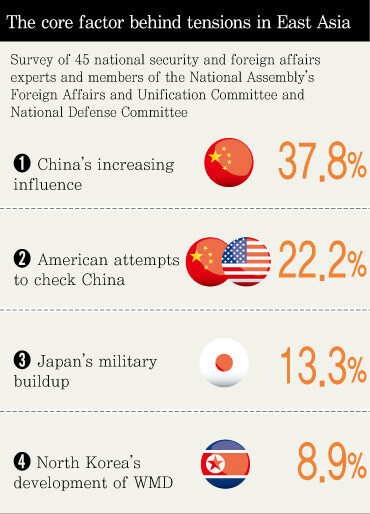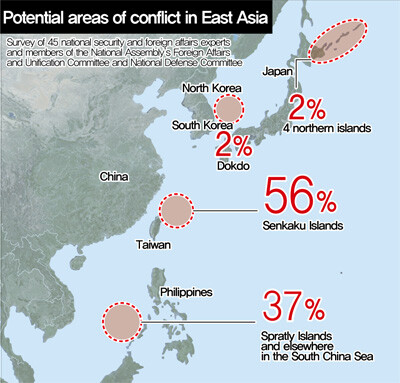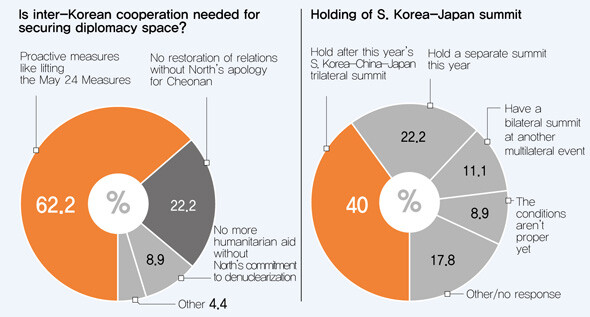hankyoreh
Links to other country sites 다른 나라 사이트 링크
Opinion leaders argue for ‘dolphin’, not shrimp, foreign policy

The idea of relying on the US for security and on China for the economy is a strategy for East Asia that is generally understood and broadly supported in South Korea. To mark the 70th anniversary of Korea‘s liberation from Japanese colonial control and the division of the peninsula into North and South, the Hankyoreh carried out a survey of experts in the areas of foreign policy and security and lawmakers on the National Assembly’s Foreign Affairs and Unification Committee and its National Defense Committee.
Notably, the majority of the respondents to the survey were skeptical about this China-US two-track strategy. This skepticism is thought to reflect a desire for an alternative strategy for diplomacy and security that can help South Korea stay atop the waves of conflict between the US and China.
75.5% of respondents to the survey expressed doubts about the China-US two-track strategy, with 13.3% saying that it was unsustainable and 62.2% saying that a new strategy should be devised based on balanced diplomacy.
These experts think that the strategy is not only a dangerous choice that runs the risk of displeasing both the US and China, two of the world‘s most powerful countries, but also a passive strategy that does not suit the status of South Korea, which has risen to become a dolphin-like middle power.
“The China-US two-track strategy is wrong-headed and unsustainable,” said Jeon Jae-seong, a professor at Seoul National University.

“China is gradually creating a security regime by which it hopes to exert a major influence on East Asia, while the US is also having a major effect on the economic architecture of East Asia through the Trans-Pacific Partnership (TPP). South Korea needs to pursue a balanced foreign policy through norms and systems that can harmonize the two orders being built separately by the US and China,” Jeon said.
“Since security and the economy need to form a virtuous cycle, the China-US two-track strategy cannot be sustained,” said Yang Moo-jin, a professor at the University of North Korean Studies.
“There’s some validity to the idea of relying on China for the economy and on the US for security, but we need a new strategy that will achieve balance between the US and China and between China and Japan for our national interest and survival,” said a lawmaker with the New Politics Alliance for Democracy (NPAD) who spoke on condition of anonymity.
When asked about the basic strategy for security that South Korea should adopt in the competition between the US and China, 66.7% of respondents preferred inter-Korean cooperation and construction of a system for cooperation in the East Asian community over either-or choices such as strengthening South Korea’s alliance with the US and the passive tight-rope strategy of maintaining equal distance between the US and China. This can also be interpreted as an appeal for a paradigm shift.

“The way for South Korea to reduce the possibility that it will have to choose between the US and China is to improve inter-Korean relations. In the long term, it needs to ease the tension between opposing alliances by creating a cooperative order in the East Asian community,” said Kim Jun-hyeong, a professor at Handong Global University. Kim thinks that, in order for South Korea to avoid being forced to choose sides in a conflict between the US and China, it should take the lead in creating a structure of regional cooperation on the Korean Peninsula and in East Asia.
“The prerequisite for engaging in ’dolphin diplomacy‘ between the US and China is improving relations with North Korea. Inter-Korean cooperation is inextricably connected with the East Asian community,” said Kim Chang-soo, director of the Korea National Strategy Institute.
“South Korea needs to keep an eye on and take advantage of the multilateral and overarching trends in East Asia,” said Chang Yong-seok, senior researcher at the Institute for Peace and Unification Studies at Seoul National University.
“If the tension with North Korea is not resolved, military conflict on the Korean Peninsula could break out at any time,” said Rep. Kwon Eun-hee, a NPAD lawmaker.
The respondents’ attitude toward President Park Geun-hye‘s plan to attend a Chinese military review marking the victory over Japan in World War II can be seen as a question of what choices “dolphin Korea” is actually going to make.
The majority of respondents recommended that Park attend (51.1%) or choose the compromise course of visiting China without attending the review (35.6%), with only 6.7% recommending that she not go at all.
Experts who advised Park not to go focused less on the idea of visiting China than on the character of the military review.
Kim Jae-cheol, a professor at the Catholic University of Korea, noted that the “military review is associated with the Cold War and with conflict,” while Lee Tae-ho, secretary general of People’s Solidarity for Participatory Democracy, said he was opposed to the idea of attending the military review of any country. Lee argues that South Korea will have a better chance of acting on its own - without asking the US and China for permission - if it consistently advocates the values of peace and cooperation.
An issue that similarly reflects the conflict between the US and China is the question of whether THAAD (Terminal High-Altitude Area Defense), a missile defense system, should be deployed in South Korea. When asked about deploying THAAD, 53.3% were opposed, compared to 26.7% in favor.
“THAAD is intended to defend against North Korean nuclear weapons and missiles, and it is an issue for South Korea to decide. China‘s objection to deploying THAAD infringes upon our sovereignty,” said Rep. Song Yeong-geun with the Saenuri Party (NFP), who supports the idea of deployment.
Rep. Ahn Gyu-baek with the NPAD expressed the opposing view. “THAAD isn’t appropriate for the relatively small operational environment of the Korean peninsula, and adequate consideration must also be given to the issue of cost, political pressure from China, and the possibility of provoking a military arms race in East Asia,” Ahn said.
“We need this weapons system, but we’re not in a position to request it until the US provides more details and expresses its own position,” said Rep. Na Kyung-won, chair of the Foreign Affairs and Unification Committee, offering an alternate view.
When asked about the key factor creating tensions in East Asia, respondents selected China’s increasing influence (37.8%), American attempts to counter China (22.2%), Japan‘s military buildup (13.3%), and North Korea’s development of weapons of mass destruction (8.9%).
Sogang University Professor Kim Yeong-su was one of those who emphasized the factor of North Korea. “The rivalry between the US, China, and Japan also plays a role in creating tension, but this is a long-term and predictable factor. In contrast, North Korea‘s development of weapons of mass destruction is a key factor in creating tension and could be a game changer in East Asia,” Kim said.
Kim Yeon-cheol, professor at Inje University, examined the structural relationship between the American and Chinese competition on the one hand and Japanese and North Korean reactions on the other, as well as the resulting tension. “The US is trying to check China while China is attempting to increase its influence, leading to a time of transition in the regional order. Japan is taking advantage of the power vacuum to move to the right, while North Korea is developing nuclear weapons.”
In regard to the increasingly fierce competition for power in East Asia between the US and China, 88.9% of respondents thought that the two country’s relationship would continue to be marked by cooperation and tension as it is as present.
“The US and China will be at odds over politics and security but will strengthen competition and cooperation in the area of the economy. Since neither country will be able to take the lead, their paradoxical relationship will continue,” said Rep. Kim Tae-ho with the Saenuri Party.
By Park Byong-su, senior staff writer
Please direct questions or comments to [english@hani.co.kr]

Editorial・opinion
![[Column] Season 2 of special prosecutor probe may be coming to Korea soon [Column] Season 2 of special prosecutor probe may be coming to Korea soon](https://flexible.img.hani.co.kr/flexible/normal/500/300/imgdb/original/2024/0426/3317141030699447.jpg) [Column] Season 2 of special prosecutor probe may be coming to Korea soon
[Column] Season 2 of special prosecutor probe may be coming to Korea soon![[Column] Park Geun-hye déjà vu in Yoon Suk-yeol [Column] Park Geun-hye déjà vu in Yoon Suk-yeol](https://flexible.img.hani.co.kr/flexible/normal/500/300/imgdb/original/2024/0424/651713945113788.jpg) [Column] Park Geun-hye déjà vu in Yoon Suk-yeol
[Column] Park Geun-hye déjà vu in Yoon Suk-yeol- [Editorial] New weight of N. Korea’s nuclear threats makes dialogue all the more urgent
- [Guest essay] The real reason Korea’s new right wants to dub Rhee a founding father
- [Column] ‘Choson’: Is it time we start referring to N. Korea in its own terms?
- [Editorial] Japan’s rewriting of history with Korea has gone too far
- [Column] The president’s questionable capacity for dialogue
- [Column] Are chaebol firms just pizza pies for families to divvy up as they please?
- [Column] Has Korea, too, crossed the Rubicon on China?
- [Correspondent’s column] In Japan’s alliance with US, echoes of its past alliances with UK
Most viewed articles
- 1Samsung subcontractor worker commits suicide from work stress
- 2Division commander ordered troops to enter raging flood waters before Marine died, survivor says
- 3No good, very bad game for Korea puts it out of Olympics for first time since 1988
- 4‘We must say no’: Seoul defense chief on Korean, USFK involvement in hypothetical Taiwan crisis
- 5[Column] Season 2 of special prosecutor probe may be coming to Korea soon
- 6Is N. Korea threatening to test nukes in response to possible new US-led sanctions body?
- 7Korea’s 1.3% growth in Q1 signals ‘textbook’ return to growth, says government
- 8US overtakes China as Korea’s top export market, prompting trade sanction jitters
- 9[Column] Has Korea, too, crossed the Rubicon on China?
- 10[Column] ‘Choson’: Is it time we start referring to N. Korea in its own terms?